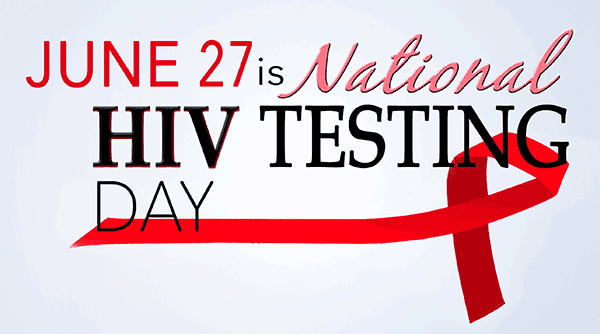National HIV Testing Day – Time to Get HIV Test?

National HIV Testing Day – Time to Get HIV Test?
According to the Centers for Disease Control (CDC), 1.2 million Americans live with Human Immunodeficiency Virus (HIV). HIV is a retrovirus that leads to Acquired Immune Deficiency Syndrome (AIDS).
Without treatment, people with HIV typically develop AIDS within 10 years. AIDS is a serious illness that is eventually fatal, which is why early detection of HIV is so essential. The CDC states that approximately one person in eight who currently has HIV is unaware of it. Each year, approximately 45,000 people receive a diagnosis of HIV.
Why the CDC Created National HIV Testing Day
The CDC promotes National HIV Testing Day every year on June 27. The agency advises all people between the ages of 13 and 64 to receive an HIV test annually as part of a routine health screening.
Those with certain risk factors could benefit from more frequent testing. These include men who have had sex with other men as well people who have engaged in the following:
- Anal or oral sex with another HIV-positive person
- Injected drugs or shared needles with others
- Had more than one sexual partner since his or her last HIV test
- Been diagnosed with or received treatment for another sexually transmitted disease
- Exchanged sex for money or drugs
- Had sex with a person without knowing his or her sexual history
- Been treated for tuberculosis or hepatitis
Your healthcare professional is the best one to advise you on how often you should get HIV test. The CDC recommends HIV testing every three to six months for gay and bisexual men.
Benefits of Annual HIV Testing
HIV testing is beneficial whether you test positive or negative. While it’s difficult news to get a positive result, the diagnosis allows you to start on medication promptly that can keep both you and your partner healthy for as long as possible.
See also: What is the Difference Between Confidential and Anonymous HIV Testing?
By taking extra precautions, you can minimize the likelihood of passing HIV to your sexual partner.
If you get a negative result, you have many resources and tools available to prevent a positive result in the future. A pregnant woman who is HIV-positive can reduce the risk of passing the virus to her fetus by starting treatment promptly.
How HIV Testing Works
A sample of your blood, urine, or oral fluid is normally adequate to determine if the HIV virus is present in your body. Three types of HIV tests exist, including antibody, fourth-generation tests, and nucleic acid tests. Most fall into the first category.
When HIV produces antibodies, they are typically detectable in the blood three to 12 weeks after exposure. They tend to show up faster in blood than oral fluid and do not appear in urine. A rapid antibody test can give a result in approximately 30 minutes. You can get results even faster with an oral swab test.
If you choose to do a blood test, you collect a sample at home and send it to a local laboratory. You then need to follow-up with the laboratory for results, which could be as soon as the next business day. Whether you test at home or a clinic, you need to follow up with a medical professional to confirm the results.
A fourth-generation test detects both antigens and antibodies. Antigens are foreign substances that attack your immune system. If you have HIV, an antigen called p24 develops before the antibodies. This test can detect a positive result two to six weeks after your initial exposure.
The nucleic acid test detects HIV in the bloodstream rather than antigens or antibodies. This can occur within one to four weeks of exposure. Although highly accurate, this HIV test is also very expensive and not normally used unless the person has early HIV symptoms or recent high-risk exposure.
If you’re unclear whether your medical provider routinely tests for HIV, be certain to ask. You may need to ask for a referral to another healthcare organization if your own doesn’t have the resources to run this test. Just remember that remaining proactive is the best approach when it comes to something this important.




